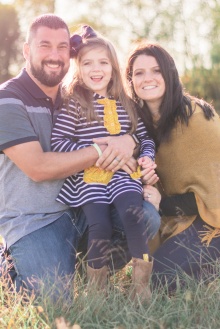Hadley Jo Brindley

The Brindley Family
Hope for the First Time
By Kathy Swenson
Hadley Jo Brindley was born in May 2014. From her first breath, she became and will always remain, the center of Ashley and Casey Brindley’s world.
At first, Hadley Jo reached all the normal developmental milestones, but at 18-months, her mother and father noticed that she was experiencing challenges.
“Her right eye was drifting and that, combined with her not walking, was a concern,” Ashley recalls.
The Brindleys consulted with their local optometrist in Kentucky, who referred them to a pediatric ophthalmologist. The specialist ordered an MRI, and a week later the couple was told that the imaging revealed abnormalities in Hadley Jo’s cerebellum, the part of the brain that controls balance and coordination. Blood work and a genetic testing were then ordered for Hadley Jo.
“They found an error in a gene called SLC25A46,” says Ashley. “That’s all they knew; they couldn’t tell us anything more.”
Frustrated and worried, Ashley began doing her own research online and found the name of the physician-scientist who discovered the mutation and was researching it—Taosheng Huang, MD, PhD, now chief of the Division of Genetics in the Department of Pediatrics at the Jacobs School of Medicine and Biomedical Sciences.
The Brindleys immediately contacted Huang and made an appointment for their daughter to see him.
During the visit, Huang explained that Hadley Jo has Hereditary Motor and Sensory Neuropathy, Type VIB (HMSN6B), a rare form of mitochondrial genetic disease for which there is currently no treatment or cure.
"The opportunity to meet and talk with Dr. Huang—the physician who had discovered this condition and is researching it—is the first time we actually had hope,” Ashley says. “He is caring for patients with the disorder and they are living into adulthood.”
Because research on rare diseases like Hereditary Motor and Sensory Neuropathy is often unfunded or underfunded, the Brindley’s established the Hadley Jo Foundation aimed at raising awareness and monies for Huang’s research. To date, through community support and fundraising events, they have raised and donated over $115,000.
“Our ultimate goal is to give our daughter every chance to do whatever she wants—something as simple as playing soccer, just running and kicking a ball,” says Ashley.
“I am truly grateful for the support and trust of the Brindley family,” Huang says. “Philanthropy accelerates research and increases the potential for discoveries to be rapidly translated into treatments.”
Steven E. Lipshultz, MD, A. Conger Goodyear Professor and Chair of the Department of Pediatrics in the Jacobs School, adds: “The Brindley family’s efforts demonstrate a commitment to medical discoveries. Their support, coupled with that of other generous families, will enable Dr. Huang and the Division of Genetics to grow its leading-edge scientific and clinical expertise in genomic medicine.”
Ashley says that she and her husband are very grateful for Huang’s dedication to Hadley Jo and to research into her condition. “He truly cares, and he gives us hope,” she says.
To the support the Department of Pediatrics, contact Kathy M. Swenson, senior director of advancement for the Jacobs School of Medicine and Biomedical Sciences, at kswenson@buffalo.edu or call 716-829-5052.